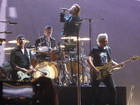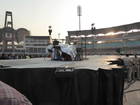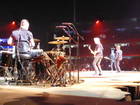Some things are more important than setlists
U2gigs.com is a bit of a worldwide effort. Personally, I live in Melbourne, the capital of the Australian state of Victoria. On Saturday, Victoria suffered its worst day ever as it was ravaged by the most extreme bushfires in Australia's recorded history. That is why I am taking the rather unusual step of publishing an article on the site that has nothing to do with U2, as I think what happened is worth sharing with the U2 fan community and hopefully some of you can help in the aftermath.
Australia is a country known for its bushfires. They are a natural part of the ecosystem and occur with marked frequency. The previous worst bushfire in Australia's history was Ash Wednesday, 1983, when 75 people died - 47 in Victoria and 28 in South Australia. The previous highest death toll in Victoria alone was 71 in the Black Friday fires of 1939. What has just occurred here was something else entirely. The official death toll from the fires is presently at 181 and may climb past 300. Hundreds more are injured and thousands are homeless, with charities such as the Australian Red Cross Bushfire Appeal working tirelessly to help them.
Saturday was the hottest day in the state's history. Central Melbourne recorded 46.4 Celsius (115.5 Fahrenheit); Hopetoun in the west of the state recorded 48.8 (119.8). Relative humidity was a meagre 6% and wind gusts exceeded 80km/h (50mph). Stepping outside was like walking into a blast furnace. Furthermore, Victoria has been in a prolonged drought all decade. The state was a tinderbox, ready to catch alight, and fires burned throughout the day. At around 5-6pm, a cool change reached metropolitan Melbourne as the wind suddenly shifted direction, bringing relief to those of us wilting in the heat. However, the wind change was catastrophic for thousands of people as it suddenly fanned the fires across massive fronts. The firestorm was the kind of inferno you think only exists in horror movies. Native Australian vegetation such as eucalyptus and gum trees act as natural accelerants and the fire moves through the air as much as it does along the ground. People who did everything right were overwhelmed by the unprecedented walls of fire that met them; flames exceeding forty metres in height and fireballs moving at speeds of over 100km/h. The heat was enough to kill people before the flames even reached them. The thick, billowing smoke made driving nearly impossible - if the fire didn't chase cars down, smoke obscured other vehicles and obstacles.
The aftermath looks like a warzone. Towns have been obliterated. Kinglake, Marysville, Flowerdale, Strathewen, and Narbethong are some of the places that are presently gone. Major roads and railways were cut; two rail lines remain closed. Towns from the Gippsland region to Bendigo and Horsham have suffered property damage and fatalities. It is feared that 15%, even 25% of the population of some towns may be dead. The death toll is steadily climbing as emergency services uncover more bodies in houses, cars, and the surrounding landscape. Numerous fires have continued to burn across the state since Saturday, with over twenty uncontrolled at present. Smoke from the fire has darkened the sky thousands of kilometres away in Dunedin, New Zealand. On a personal level, places I fondly know have been ravaged, people I know were fortunate to avoid physical harm or property damage, vineyards and orchards I like in the Yarra Valley are ruined, and a heritage railway that I support, the Yarra Valley Railway, has lost some historically significant infrastructure around Yarra Glen. I am simply fortunate that I live in an inner suburb of Melbourne and my life and property were never under direct threat. Nonetheless, I'm pretty rattled.
The magnitude of the disaster is hard to comprehend or believe. The ferocity and sheer speed of fire can be hard to appreciate. Yesterday's Grammy Awards article is the most difficult article I have ever written for this site, as I tried to focus on it while news came in and the death toll continued to climb. It is impossible to find words to articulate the horror of Black Saturday and its aftermath. Thousands of people are homeless, glad simply to be alive, and a massive rebuilding process is ahead. Lives have been devastated and businesses have been ruined but the communities will be strong and resilient.
If any of you would like to support the victims, I encourage you to donate to the aforementioned Australian Red Cross Bushfire Appeal, supported by the state and federal governments. For more news, there are plenty of articles accessible from the main page of Melbourne newspaper The Age, and the ABC has a dedicated bushfires section. The Wikipedia entry does a good job of bringing together a lot of information.
Regards,
André (Axver, setlistorian)
Australia is a country known for its bushfires. They are a natural part of the ecosystem and occur with marked frequency. The previous worst bushfire in Australia's history was Ash Wednesday, 1983, when 75 people died - 47 in Victoria and 28 in South Australia. The previous highest death toll in Victoria alone was 71 in the Black Friday fires of 1939. What has just occurred here was something else entirely. The official death toll from the fires is presently at 181 and may climb past 300. Hundreds more are injured and thousands are homeless, with charities such as the Australian Red Cross Bushfire Appeal working tirelessly to help them.
Saturday was the hottest day in the state's history. Central Melbourne recorded 46.4 Celsius (115.5 Fahrenheit); Hopetoun in the west of the state recorded 48.8 (119.8). Relative humidity was a meagre 6% and wind gusts exceeded 80km/h (50mph). Stepping outside was like walking into a blast furnace. Furthermore, Victoria has been in a prolonged drought all decade. The state was a tinderbox, ready to catch alight, and fires burned throughout the day. At around 5-6pm, a cool change reached metropolitan Melbourne as the wind suddenly shifted direction, bringing relief to those of us wilting in the heat. However, the wind change was catastrophic for thousands of people as it suddenly fanned the fires across massive fronts. The firestorm was the kind of inferno you think only exists in horror movies. Native Australian vegetation such as eucalyptus and gum trees act as natural accelerants and the fire moves through the air as much as it does along the ground. People who did everything right were overwhelmed by the unprecedented walls of fire that met them; flames exceeding forty metres in height and fireballs moving at speeds of over 100km/h. The heat was enough to kill people before the flames even reached them. The thick, billowing smoke made driving nearly impossible - if the fire didn't chase cars down, smoke obscured other vehicles and obstacles.
The aftermath looks like a warzone. Towns have been obliterated. Kinglake, Marysville, Flowerdale, Strathewen, and Narbethong are some of the places that are presently gone. Major roads and railways were cut; two rail lines remain closed. Towns from the Gippsland region to Bendigo and Horsham have suffered property damage and fatalities. It is feared that 15%, even 25% of the population of some towns may be dead. The death toll is steadily climbing as emergency services uncover more bodies in houses, cars, and the surrounding landscape. Numerous fires have continued to burn across the state since Saturday, with over twenty uncontrolled at present. Smoke from the fire has darkened the sky thousands of kilometres away in Dunedin, New Zealand. On a personal level, places I fondly know have been ravaged, people I know were fortunate to avoid physical harm or property damage, vineyards and orchards I like in the Yarra Valley are ruined, and a heritage railway that I support, the Yarra Valley Railway, has lost some historically significant infrastructure around Yarra Glen. I am simply fortunate that I live in an inner suburb of Melbourne and my life and property were never under direct threat. Nonetheless, I'm pretty rattled.
The magnitude of the disaster is hard to comprehend or believe. The ferocity and sheer speed of fire can be hard to appreciate. Yesterday's Grammy Awards article is the most difficult article I have ever written for this site, as I tried to focus on it while news came in and the death toll continued to climb. It is impossible to find words to articulate the horror of Black Saturday and its aftermath. Thousands of people are homeless, glad simply to be alive, and a massive rebuilding process is ahead. Lives have been devastated and businesses have been ruined but the communities will be strong and resilient.
If any of you would like to support the victims, I encourage you to donate to the aforementioned Australian Red Cross Bushfire Appeal, supported by the state and federal governments. For more news, there are plenty of articles accessible from the main page of Melbourne newspaper The Age, and the ABC has a dedicated bushfires section. The Wikipedia entry does a good job of bringing together a lot of information.
Regards,
André (Axver, setlistorian)
Posted on by Axver




